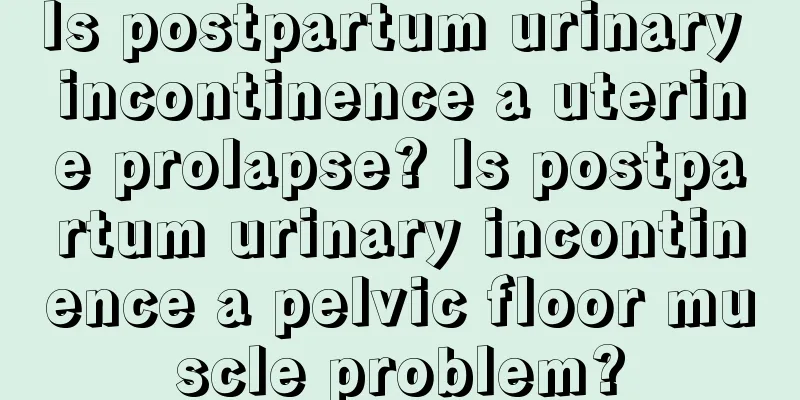Is postpartum urinary incontinence a uterine prolapse? Is postpartum urinary incontinence a pelvic floor muscle problem?

|
Almost all mothers will experience urine leakage after giving birth, which is a very embarrassing situation. However, many mothers do not know the specific reasons for urine leakage after childbirth. So let's find out whether urine leakage after childbirth is caused by uterine prolapse or pelvic floor muscle problems. Is postpartum urinary incontinence caused by uterine prolapse?Urinary incontinence is not necessarily caused by uterine prolapse, but it cannot be ruled out. Postpartum urinary incontinence is also called urinary incontinence in clinical practice. It may be caused by poor pelvic repair, or it may be caused by long-term increased abdominal pressure, such as chronic cough or constipation during the period, which may cause urinary incontinence over time. For more serious uterine prolapse, postpartum urinary incontinence will occur. Urinary incontinence is also likely to be caused by uterine prolapse, but there may be other reasons. Postpartum urinary tract infection or pelvic relaxation can also cause urinary incontinence, so it is recommended that you go to the hospital for a check-up and symptomatic treatment. If it is caused by uterine prolapse, it should be a more serious phenomenon. You can use a pessary for treatment. If it does not work, surgery is required. Is postpartum urinary incontinence a pelvic floor muscle problem?Postpartum urinary incontinence is actually a situation of functional urinary incontinence caused by weakened pelvic floor muscle function. The pelvic floor muscle is a group of muscles that close the pelvic floor. It is also like a mesh of muscles. On it are the urethra, bladder and other organs, all supported by this elastic mesh. After the muscle is damaged, the mesh cannot put these organs in their normal position. During pregnancy, as the fetus develops, the uterus continues to grow, which will put a certain amount of pressure on the tissues and organs in the mother's body, which can easily cause certain damage, especially to the pelvic floor muscles. Excessive pressure and traction during delivery may cause certain damage to the organs and muscles of the pelvic floor. Under normal circumstances, when the bladder stores a certain amount of urine, coupled with increased abdominal pressure, such as coughing and sneezing, the pelvic floor muscles can withstand it. But when a postpartum woman is injured, the pelvic floor muscles cannot withstand these pressures. When does postpartum urinary incontinence occur?Postpartum urinary incontinence may occur immediately after delivery and is a normal physiological phenomenon. The main reason for postpartum urinary incontinence is that the pelvic floor muscles and vagina of the mother are in a tight state for a long time during the delivery process, so they cannot recover their elasticity in time after delivery, resulting in urinary incontinence in the mother. Usually, the urinary incontinence phenomenon will be effectively alleviated after the mother's body has basically recovered or has done proper exercise. If the muscles are damaged and cannot contract, the patient's urinary incontinence will continue to occur. Therefore, it is recommended that patients with urinary incontinence should go to the hospital in time for pelvic floor muscle rehabilitation and exercise. What is postpartum urinary incontinence?Many mothers will encounter this. Some people may have a little urine leakage when coughing or sneezing during pregnancy, and it will recover on its own without any treatment after delivery. But some people will find that they will have urine leakage when they hold their baby after three months or even half a year after delivery. At this time, women should come to the hospital to see what the problem is. Some people's urine leakage occurs just after giving birth. Some people say that urine flows down the legs after giving birth. This problem of difficult urine control may be relieved by itself as the pain of the wound is relieved and the scar of the pelvic floor muscle wound softens. The urine leakage will naturally become lighter and lighter and disappear. However, some people's urine leakage will not disappear completely. It depends on whether there is a scar, or even the weakness caused by excessive tension and spasm of the muscles of the pelvic girdle, which can cause pelvic floor urine leakage. This is a hypertonic one. Another type is complete pelvic floor relaxation. After giving birth, the front and back walls of the vagina bulge, the pelvic floor muscles are particularly weak, and then when the pelvic floor is contracted, there is no sense of anal retraction. This type of person will have a relatively serious urine leakage. This kind of complete recovery is also relatively difficult, and it may be necessary to strengthen the pelvic floor muscles with the assistance of machines or equipment and then recover on this basis. |
Recommend
What is Lansinoh? A maternal and infant brand that helps breastfeeding
Lansinoh is a maternal and infant brand registere...
What are the side effects of ovulation medication for women?
More and more people are infertile, and many wome...
What flavors does Shuke toothpaste have? Can Shuke toothpaste reduce inflammation?
It seems that Shuke toothpaste has more than one ...
The attitudes and shortcomings of the twelve zodiac signs towards love
There are several stages in dating, and the most ...
What safety precautions should be taken when babies play outdoors
As babies grow up, they will become curious about...
Can I brush my baby's teeth during the replacement period? Can I brush my child's teeth during the replacement period?
During the period of teeth replacement, babies wi...
Which is better, Kao Pampers or Unicharm diapers? - Usage comparison
Kao, Pampers, and Unicharm are all maternal and i...
What causes neonatal eczema? How to treat neonatal eczema?
What should you do if your newborn baby has eczem...
Does alum have any effect on pregnant women? What are the harms of alum to pregnant women?
Alum is a very common medicine and is often added...
Can 84 disinfectant be used to wash clothes? Can 84 disinfectant be used to bleach shoes?
84 disinfectant is generally a colorless or light...
How often should a baby take a bath?
Many new parents don't know how often to bath...
What clothes should babies wear in autumn? Things to pay attention to when dressing babies in autumn
The weather is cool in autumn, and the temperatur...
How to count fetal movements? The importance of measuring fetal movements during pregnancy
Mothers can feel the baby moving in their belly i...
How can a new mother quickly learn how to prepare milk powder for her baby?
Are you still a little uncomfortable with becomin...
Can a laundry bag clean clothes? What is the function of a laundry bag?
Nowadays, many people use laundry bags to wash cl...









